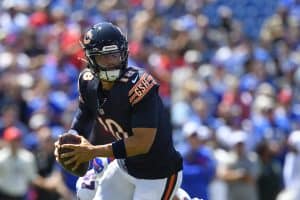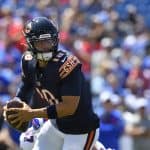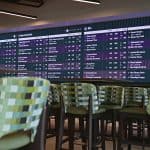NFL betting is a thrilling but challenging pursuit, requiring not just knowledge of the sport but also an understanding of the psychological traps that can ensnare even the most seasoned bettors. The complexities of human behavior often lead to decisions that are not based on logic but on emotion, which can significantly impact your betting outcomes. Here we will get into those NFL EV betting mistakes and pitfalls, explain how to avoid them and show you how you can leverage market-based resources like Portfolio EV to make smart, informed decisions.

👉 Check Out the FREE Expert Picks »
The Free Picks on Tails are your shortcuts to smarter bets … no signup, no strings. Here you will find a bunch of FREE expert picks, updated daily.
NFL Betting Mistakes and How to Avoid Them With EV Betting
First things first, we need to explain what EV betting is in order to see how these betting mistakes run contrary to it. Check out our guide to NFL EV betting for a full breakdown of it, but in simplest terms, expected value (EV) betting in the NFL, or in any sport, refers to a statistical concept that helps bettors determine whether a particular bet is likely to be profitable over the long run. EV is the average amount a bettor can expect to win or lose per bet if they were to place the same bet multiple times.
Now let’s get into the most common ways bettors forgo EV betting.
Understanding Psychological NFL Betting Mistakes
Chasing Losses
After a losing bet, the instinct to immediately place another wager to recover lost funds can be overwhelming. This is often driven by a combination of frustration, fear of missing out and a desire to return to a breakeven point. The “sunk cost fallacy” plays a significant role here. Bettors feel that they need to recover their previous losses, leading them to make hasty, ill-advised bets without proper analysis.
Implementing strict bankroll management and setting loss limits can help you avoid this trap. It’s essential to remember that each bet should be independent of the last, and betting out of desperation is a recipe for further losses.
Overconfidence
On the other side of that equation, bettors often believe they have cracked the code after nailing a few bets in a row, leading them to take greater risks. This inflated sense of skill can result in larger bets on less researched outcomes, which can quickly lead to significant losses. The illusion of control often causes overconfidence, and bettors may mistakenly believe that their success is due to their magically found expertise rather than luck or variance.
Humility is key in betting. Consistently reviewing your betting history, including both wins and losses, can help maintain a realistic perspective on your abilities. Also, utilizing tools like Portfolio EV, which provides data-driven insights and expected value (EV) calculations, can keep your decision making grounded in logic rather than emotion.
Confirmation Bias
Confirmation bias occurs when bettors favor information that confirms their pre-existing beliefs or predictions while disregarding data that contradicts them. This can lead to placing bets based on skewed or incomplete analysis. This bias is rooted in the natural human tendency to seek validation for our beliefs, leading us to selectively gather information that aligns with our expectations.
To combat confirmation bias, be systematic with your research. Check with a diverse range of sources, even those that challenge your initial assumptions. Again, Portfolio EV can be particularly useful here because it uses true data-driven analysis, which inherently counteracts personal biases.

Start building your bankroll and securing long-term profits with Portfolio EV. Take advantage of our FREE TRIAL to unlock more +EV bets — visit our Portfolio Betting page to begin your journey!
Recency Bias
Recency bias is the tendency to place undue emphasis on the most recent events, believing they are more predictive of future outcomes than they actually are. For example, a team on a short-term winning streak might lead bettors to overlook long-term trends or underlying weaknesses. The brain is naturally inclined to give more weight to things it last took in because it is more vivid and readily accessible in our memory.
To avoid recency bias, always consider the broader context and historical data when making betting decisions. Reach out to analytical tools that factor in a wide range of data points and long-term performance metrics (i.e. — you guessed it — our EV bets).
The Gambler’s Fallacy
The gambler’s fallacy is the belief that past events can influence the outcome of future independent events. For example, the fallacious gambler would believe that, because a coin landed on heads five times in a row, it is now more likely to land on tails. This fallacy is a simple misunderstanding of probability and randomness. People naturally look for patterns, even in random sequences.
Understanding the true nature of probability is crucial. Each NFL game or any other betting event is independent of another — when the bets are unrelated. But also understand that this does not mean that there is no such thing as correlation with some bets, particularly player props. For example, say you are betting Ja’Marr Chase to go over on his receiving yardage total since the Bengals are playing a bad pass defense in this hypothetical scenario. It stands to reason that Joe Burrow should also be in a good spot to go over his passing yardage total since he gets yards whenever Chase does.
Of course, as with any EV bets, this is not guaranteed since sportsbooks can anticipate such correlation and set lines and odds accordingly. The trick is finding correlative bets that sportsbooks have not accounted for — that’s where you can get strong +EV same-game parlays.
So basically, it’s important to grasp the difference between bets that correlate — which can be valuable — and bets that have no true relevance to each other despite what past results may suggest.
Strategies for Maintaining Discipline and Objectivity
Set Clear Goals and Limits
Establish clear betting goals, whether it’s a target profit or a maximum loss you’re willing to accept. This helps prevent emotional decision making, especially in high-pressure situations.
Stick to a Betting Strategy
Develop a well-defined betting strategy that includes criteria for when and how to place bets. Consistently following this strategy can help you avoid making impulsive decisions based on emotional reactions.
Leverage Data-Driven Tools
Utilizing tools like Portfolio EV can enhance your betting strategy by providing objective, data-driven insights. These tools analyze betting lines and expected value to help identify profitable opportunities, reducing the influence of biases and emotions on your decisions.
Take Breaks
Regularly taking breaks from betting can help you maintain perspective and avoid burnout. This also allows you to return to betting with a clear mind, better equipped to make objective decisions.
Reflect and Learn
Regularly reviewing your bets, both wins and losses, can provide valuable insights into your decision-making process. This reflection helps identify patterns of behavior that may be leading to poor outcomes, allowing you to make adjustments and improve your overall betting strategy.
Conclusion
NFL betting can be as psychologically demanding as it is exciting. By recognizing and avoiding common psychological pitfalls such as chasing losses, overconfidence, confirmation bias, recency bias, and the gambler’s fallacy, you can improve your betting performance. Implementing disciplined strategies, leveraging tools like Portfolio EV, and maintaining a reflective approach to your betting habits will help you make more informed and objective decisions, ultimately leading to a more successful and sustainable betting experience.




























